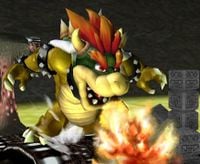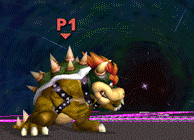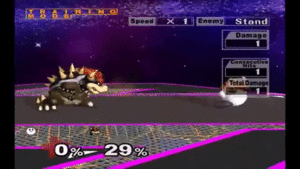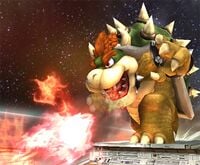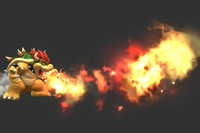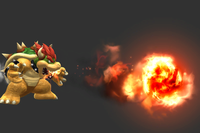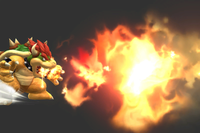Fire Breath
| Fire Breath | |
|---|---|
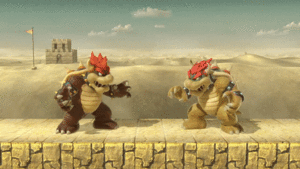 Fire Breath in Super Smash Bros. Ultimate. | |
| Users | Bowser Giga Bowser |
| Universe | Mario |
| Article on Super Mario Wiki | Fire Breath |
Fire Breath (クッパブレス, Koopa Breath) is Bowser's neutral special move.
Overview[edit]
While holding the special button, Bowser continuously exhales a stream of fire in front of him, which gradually decreases in length over time. In Super Smash Bros. Brawl onwards, the flames can be angled up and down and will never completely recede, unlike in Super Smash Bros. Melee, where Bowser will eventually begin to exhale smoke instead.
In general, Fire Breath's long duration is useful for staving off opponents and preventing their return to the stage, while also assisting with defensive play in neutral while dealing heavy damage. Unfortunately, an opponent using DI can escape the flames fairly easily in most directions, although as time has gone on this issue has become much less prevalent. For example, in Super Smash Bros. Ultimate, opponents can rarely escape without taking an upwards of 25%. If used too much, however, Bowser will have to recharge his breath, punishing players for overuse and requiring it to be used carefully. The fire will flow off of floors and walls, and can actually split in two directions if the angle is perpendicular, allowing for interesting mixups on walled stages.
This special attack is shared by Giga Bowser, both in his boss and playable appearances. There is no time limit to how long the attack can be held in his Melee or Ultimate incarnations, and the range is much longer.
In Super Smash Bros. Melee[edit]
In Melee, Fire Breath originated as a defensive maneuver for Bowser to make use of. However, its slow startup made it a very risky move to use, with it requiring 28 frames just to start coming out. However, it greatly made up for this in its formidable range and large amounts of hitboxes. It was easy to SDI, however, making it overall one of the worst projectiles in the game. This was due to characters being able to SDI towards Bowser, escape it, and punish Bowser for virtually free due to the 30 frames of endlag. Flame canceling helped the move, but was removed after NTSC 1.1, leaving it out of the tournament standard. Thus, as a result of it being easy to react to and its endlag, Bowser's Fire Breath was solidified as one of the worst special moves in the game. Strangely, Kirby is still able to make use of flame canceling in all versions of Melee if he copies Bowser's ability.
Flame cancelling[edit]
Flame canceling is an advanced technique exclusive to Bowser's Fire Breath in NTSC versions 1.0 and 1.1 of Super Smash Bros. Melee. By extension, it applies to Giga Bowser and Kirby if Fire Breath is copied.
This technique is not possible with Bowser or Giga Bowser in the NTSC 1.2 and PAL versions, and is thus not legal in most tournaments; however, Kirby can still utilise it. Flame cancelling returned in its entirety Project M, though it was removed in version 3.6; additionally, Project+ replaced Fire Breath with a new special move entirely.
How to perform[edit]
Due to odd frame conversion between an aerial and grounded Fire Breath, the game skips the startup and goes straight to the attacking animation of Fire Breath. Effectively, Fire Breath will become a frame 1 option if done optimally. Thanks to this broad requirement, landing with Fire Breath at any point prior to the attack coming out will cause a flame cancel. Naturally, landing as close to the ground as possible gives the best chance of an optimal flame cancel. The sole limitation to the amount of frames saved is human error, making it near-effortless to learn.
Usage[edit]
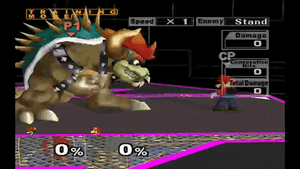
Since landing with Fire Breath in general will cause a Flame cancel to occur, there are many opportunities to utilize flame canceling. Through Flame canceling, it's possible to get some unique mindgames with Bowser, as being in the air in neutral inherently carries the risk of a flame cancel for the opponent. It's also possible to initiate it through dropping through platforms, or it could be used during tech situations with 1 frame to act. It also makes Fire Breath a slightly less situational edgeguard tool. It's also possible to jump from the ledge and initiate the tech on a platform. In this context, Bowser can get out of some difficult ledgetrap situations, which is vital given his large hurtbox. Thus, he doesn't have to always rely on his great edge attack.
While it is possible to SDI towards Bowser and exploit the minimal hitstun to punish him in the endlag, the lack of time to react can arguably lower the risk of this, allowing Fire Breath's tendency to be punishable on hit less of a problem. However, this doesn't mean it isn't, which makes using it against experienced players risky. As a result, whether the tech actually salvages Fire Breath is debatable.
It is also possible for Giga Bowser to flame cancel, though this was also patched out in NTSC 1.2. Giga Bowser arguably uses it better due to his very low short hop, shorter jumpsquat frames, and non-depleting Fire Breath, allowing for much quicker access than Bowser. If a player uses Giga Bowser through hacking, it is possible to set up edgeguards with Fire Breath quite quickly, as it goes quite far off-stage. As a result, it is possible to KO opponents very efficiently through the use of this tech in conjunction with his large hitboxes; most notably his down tilt, which goes exceptionally far off-stage.
Strangely, Flame cancelling remains possible with Kirby throughout all versions of Melee, likely an oversight by the developers. Due to his air speed and high short hop, however, it is difficult to make effective use of the tech; it tends to be easier just to use it normally. Regardless, it can be used when tomahawking or with a turnaround special as a mixup option in the matchup. It can also be a useful landing option, which is important when considering Kirby's vulnerability to juggling. It can be used as a ledge option as well, much like with Bowser.
In Super Smash Bros. Brawl[edit]
Brawl enhanced Fire Breath's utility dramatically, making it more centered around being a neutral tool than in Melee. It was much faster as well. The ability to angle the move has also improved its versatility as well, furthering its use as a neutral tool. This allowed Bowser to have more options against aerial approaches, rather than having to commit to stop them. It was also made into a formidable tool at the ledge, with characters like Donkey Kong having no chance of recovering if the move was used in the correct spot. However, Fire Breath's horizontal range was reduced, making it slightly more difficult to use it defensively.
In Super Smash Bros. 4[edit]
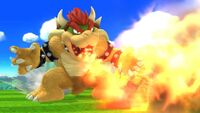
In Super Smash Bros. 4, Fire Breath gained improved speed and reach, but the outermost hitboxes could no longer flinch foes. However, the buffs greatly outweighed the nerfs, with it being combined with his formidable grab game and forward aerial to create a tough selection of attacks for an opponent to escape. Players could simply stop Fire Breath early to prevent the non-flinching area from ever coming up, and react to the opponent's response accordingly. The non-flinching hitboxes can be used to rack up damage after shield breaking an opponent or punishing a missed Rest as well, making it have additional functionality as an offensive option, unlike its previous incarnations.
In Super Smash Bros. Ultimate[edit]
Ultimate dramatically increased the damage output of the move, which, when combined with the increased 1.2x damage in 1v1s, allows it to consistently deal around 30% at close range before running out, making it an extremely potent punish and a mainstay in his toolkit. Opponents are more inclined to panic due to this drastic increase in damage, allowing Bowser to bait out worse options and punish them harder than ever before. Acting as a strong jump-in mixup and a strong deterrent to the opponent's in addition to this, Fire Breath's identity is somewhat warped around its improved damage output, making it by far its best incarnation in the series.
Instructional quotes[edit]
| The fire flows while you hold | ||
| Hold down B to belch a stream of flame. Weakens over time. | ||
| Breathe fire. Change the direction with | ||
| Breathes fire. The range decreases if used too much. The angle can be controlled a little bit. |
Customization[edit]
Special Move customization was added in Super Smash Bros. 4. These are the variations:
| 1. Fire Breath | 2. Fire Shot | 3. Fire Roar |
|---|---|---|
| "Breathe fire. Power decreases if used too much. You can control the angle a little bit." | "Spit out a fireball. Power won't change even if used in rapid succession." | "More powerful than Fire Breath, but it runs out quickly and takes longer to recharge." |
- Fire Breath: Default.
- Fire Shot: Releases a large fireball that travels far and passes through enemies. Does 6% early, 5% late. Unlike Fire Breath, Fire Shot will not weaken over time, and it has transcendent priority. Can be held, but there is a noticeable delay between each shot. It is possible to end the move earlier than with the default.
- Fire Roar: A much stronger variation of Fire Breath that loses range much quicker, and takes longer to recharge. It reaches to approximately halfway of Battlefield, and does 2.7% damage per hit sweetspotted, but only 1.8% sourspotted. The sourspot doesn't cause flinching. The minimum amount of time Bowser must use the move for is increased.
Origin[edit]
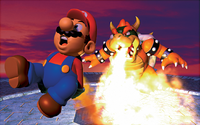
Bowser's ability to breathe fire has been demonstrated in many games he's appeared in, including his debut in Super Mario Bros., where he would shoot fireballs at Mario. These fireballs are also the inspiration for Fire Shot, one of his customizable moves in Super Smash Bros. 4. However, it wasn't until Super Mario 64 and many games after that he was shown to breathe continuous streams of fire.
Gallery[edit]
Fire Breath as shown by the Move List in Ultimate.
Names in other languages[edit]
Trivia[edit]
- This move shares its name with Piranha Plant's back aerial.
- This move is also similar to Charizard's Flamethrower in both appearance and function.
